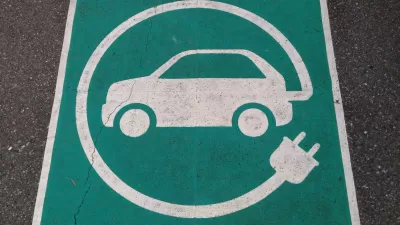Seattle's ban took effect Sunday, while San Franciso's proposed legislation, if successful, would begin July 1, 2019. Other cities have plastic straw restrictions, but Seattle's is the first outright ban. Compostable alternatives are permitted.
"In a first-of-its-kind law for any major American city, Seattle has instituted a ban on plastic straws and utensils [pdf] at all food service businesses," reports Lydia O'Connor for HuffPost. The ban took effect July 1, though the city had launched a "Strawless in Seattle" campaign last September. It is administered by Seattle Public Utilities, along with other food service packaging requirements.
The ordinance prohibits restaurants, delis, coffee shops, food trucks, cafeterias and grocery stores from providing the plastic items to customers. Upon request only, those vendors may provide people with a compostable straw or utensil.
"In San Francisco, plastic drinking straws could soon be going the way of non-reusable shopping bags [in 2007, the first city to do so] and Styrofoam containers [2017] — that is to say, strictly prohibited within city limits," reported Dominic Fracassa on May 15 for the San Francisco Chronicle. The state followed suit with the former when it banned single-use plastic bags in September 2014 and voters upheld the law in a plastics industry-initiated referendum two years later.
Like the Seattle ordinance, the San Francisco Plastic and Litter Reduction Ordinance [pdf], introduced by Supervisors Katy Tang and Ahsha Safai, would ban plastic straws and utensils. If passed, it would take effect July 1, 2019. The Seattle ban stems from an ordinance passed 10 years ago "that phases out various plastic products from the city’s food industry," according to The Seattle Times.
Why straws and utensils?
"These small pieces of plastic are among the most frequently littered items, advocates for such bans say," adds O'Connor. "They also easily make their way into the ocean when washed down storm drains and are too small to be processed by recycling centers."
"Critics of plastic straws also frequently cite a widely circulated and graphic video showing marine biologists struggling to remove one from a sea turtle’s nostril for nearly eight minutes," adds The Chronicle's Fracassa. "The video has more than [30] million views on YouTube."
Plastic straws are "frequently cited as one of the top ten contributors to marine debris pollution," according to the Surfrider Foundation which is strongly backing the proposed San Francisco ordinance.
Restrictions, not bans, more popular
Unlike Seattle and potentially San Francisco, many California cities and one county have enacted restrictions rather than outright bans, so plastic straws are available upon request. A bill would make the restriction state law.
- "San Luis Obispo’s restrictions on single-use plastic bottles, straws and cups took effect on March 1," reported Nick Wilson for The Tribune on Feb. 28, 2018.
- Malibu's "ban on restaurants and food vendors from offering or selling plastic straws, stirrers and utensils to customers" took effect June 1, reported Alene Tchekmedyian for the Los Angeles Times on Feb. 26, 2018.
- The Davis ordinance passed on June 6, 2017 and took effect on Sept.1, 2017.
- Oakland approved an ordinance on May 1, 2018 that includes a provision directing the city administrator "to return to the council in six months with draft legislation for including containers, utensils and other disposable food-service ware in the restrictions in addition to single-use straws," according to KTVU. "Santa Cruz County and the cities of Alameda and Manhattan Beach have adopted similar plastic straw regulations."
- Majority Leader Ian Calderon (D-Whittier) introduced "Straws-Upon-Request" legislation in January. Assembly Bill 1884 has passed the assembly and is awaiting to by heard by the Senate Appropriations Committee.
Finally, in April, British Prime Minister Theresa May announced her government's "intention to ban the sale of plastic straws, drink stirrers and plastic-stemmed cotton buds."
"Plastic waste is one of the greatest environmental challenges facing the world, which is why protecting the marine environment is central to our agenda at the Commonwealth Heads of Government Meeting," May said.
FULL STORY: Seattle Becomes The First Major American City To Ban Plastic Straws And Utensils

Study: Maui’s Plan to Convert Vacation Rentals to Long-Term Housing Could Cause Nearly $1 Billion Economic Loss
The plan would reduce visitor accommodation by 25,% resulting in 1,900 jobs lost.

North Texas Transit Leaders Tout Benefits of TOD for Growing Region
At a summit focused on transit-oriented development, policymakers discussed how North Texas’ expanded light rail system can serve as a tool for economic growth.

Why Should We Subsidize Public Transportation?
Many public transit agencies face financial stress due to rising costs, declining fare revenue, and declining subsidies. Transit advocates must provide a strong business case for increasing public transit funding.

How to Make US Trains Faster
Changes to boarding platforms and a switch to electric trains could improve U.S. passenger rail service without the added cost of high-speed rail.

Columbia’s Revitalized ‘Loop’ Is a Hub for Local Entrepreneurs
A focus on small businesses is helping a commercial corridor in Columbia, Missouri thrive.

Invasive Insect Threatens Minnesota’s Ash Forests
The Emerald Ash Borer is a rapidly spreading invasive pest threatening Minnesota’s ash trees, and homeowners are encouraged to plant diverse replacement species, avoid moving ash firewood, and monitor for signs of infestation.
Urban Design for Planners 1: Software Tools
This six-course series explores essential urban design concepts using open source software and equips planners with the tools they need to participate fully in the urban design process.
Planning for Universal Design
Learn the tools for implementing Universal Design in planning regulations.
City of Santa Clarita
Ascent Environmental
Institute for Housing and Urban Development Studies (IHS)
City of Grandview
Harvard GSD Executive Education
Toledo-Lucas County Plan Commissions
Salt Lake City
NYU Wagner Graduate School of Public Service



























